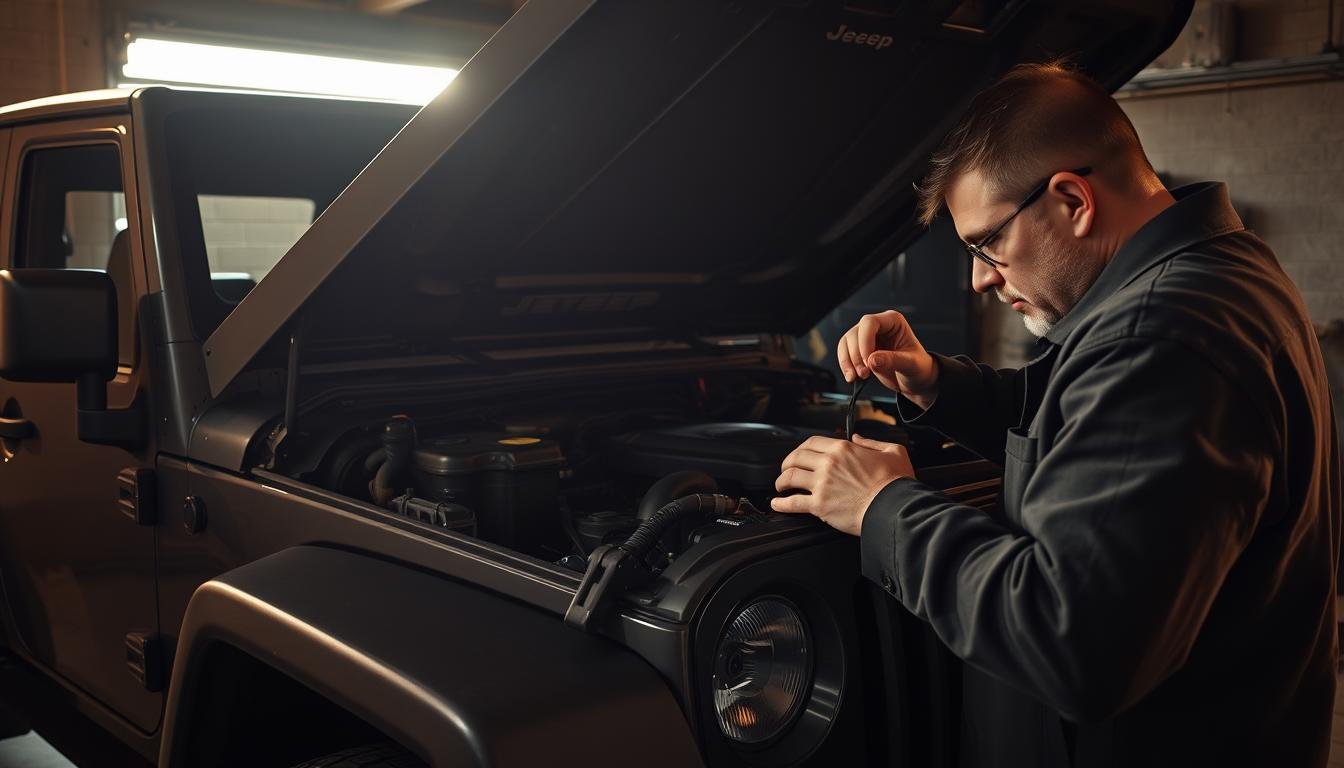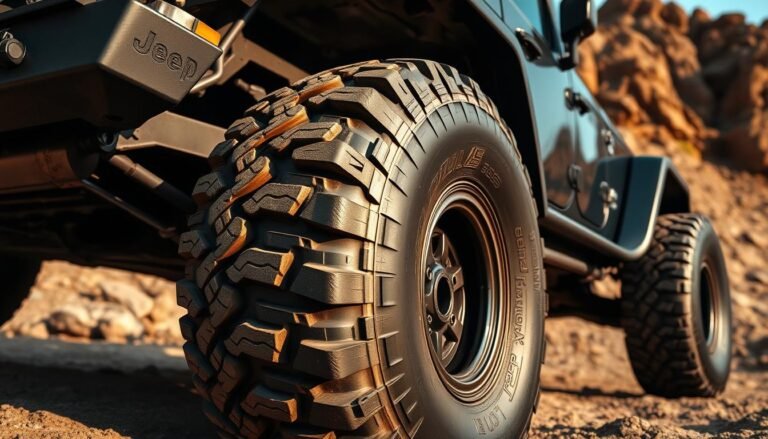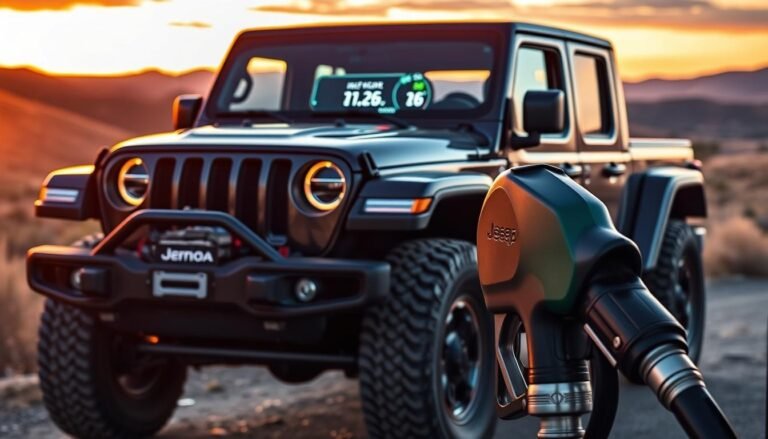Solving The Mystery: Why Won’t My Jeep Start?
Why does your Jeep refuse to start? Learn why won’t my jeep start? This problem can be quite confusing. Yet, understanding why can help you find a fix.
Key reasons often include the battery, starter, ignition, and engine issues. We’ll guide you through identifying and fixing the starting problems of your Jeep.
First, check your battery’s condition and its connections; a weak battery is usually the main issue.
Then, listen for strange sounds when you try to start your Jeep, which could mean starter troubles. Also, look into the ignition system and how the engine is performing.
With this info, you can confidently tackle the problem. Now, let’s look closer at why your Jeep might not start. We’ll cover how to spot and fix these issues step by step.
Common Reasons For Jeep Not Starting
When your Jeep won’t start, finding the cause is key. Battery issues and starter problems are often to blame. Knowing how they work and fail helps fix the issue faster.
Battery Issues and Connections
Battery troubles can stop your Jeep from starting, mainly if it’s weak or the terminals are corroded.
It’s important to check the battery for corrosion regularly and make sure connections are tight. If the battery’s power is too low, you might need to replace it or clean the terminals.
Not fixing these issues can mean your vehicle won’t start when you most need it.
Starter Malfunctions
Starter problems are another top reason a Jeep may not start. Unusual noises when turning the key could mean the starter is bad.
This situation often means the starter can’t get the engine going. Fixing these issues quickly helps keep your Jeep running well.
Why Won’t My Jeep Start: Diagnosing The Problem?
Knowing what signs to look for can help fix your Jeep’s starting issues quicker. Watch the symptoms carefully.
Does the engine crank but then fail to start? Or maybe nothing happens when you turn the key? These clues are key to figuring out why your Jeep won’t start.
Observing The Symptoms
Pay attention to how your Jeep behaves when you try to start it. Pinpointing exact symptoms helps identify why it won’t start.
Let’s look at a few things:
- Engine cranks but does not start
- Silent when the key is turned
- Clicking sound without engine movement
- Unusual smells or smoke
Check Engine Light and Codes
Seeing the check engine light on is a big hint. It can light up for small or big problems.
By using an OBD-II scanner, you can get codes that tell you what’s wrong. This is a great way to figure out the issue with your Jeep.
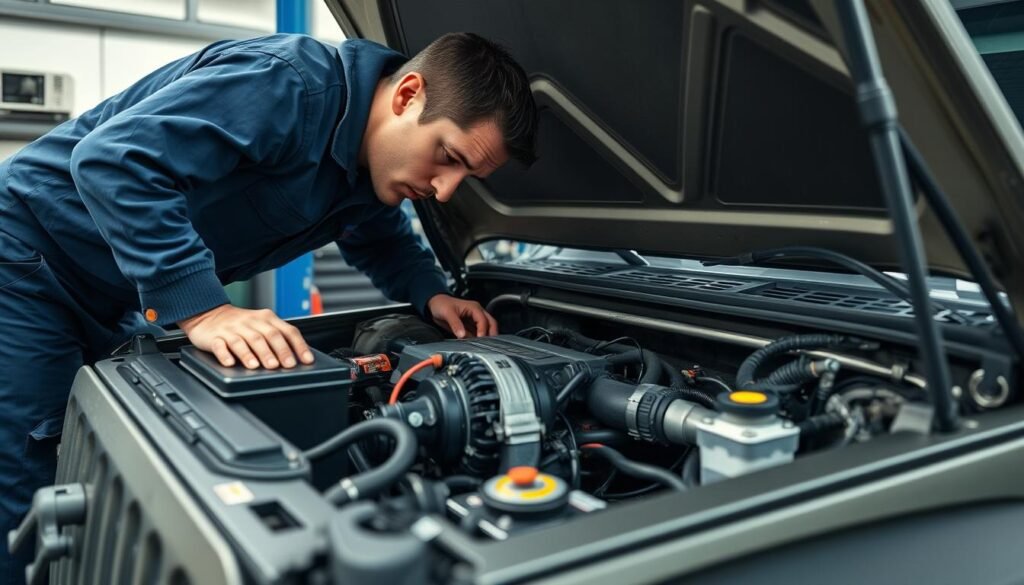
| Check Engine Light CodePossible Issue | |
|---|---|
| P0335 | Crankshaft Position Sensor Malfunction |
| P0420 | Catalytic Converter Efficiency Below Threshold |
| P0700 | Transmission Control System Malfunction |
Understanding symptoms and reading check engine codes are key to fixing your Jeep. Use this info to guide your troubleshooting or repairs.
Troubleshooting Jeep Starting Issues
When your Jeep won’t start, check the ignition system and the battery first. These are key for making sure your Jeep starts properly. Solving issues here often fixes starting problems.
Assessing The Ignition System
The ignition system is crucial for starting your Jeep. First, see if the ignition switch works right. Look at the spark plugs for any wear or damage.
Faulty plugs can stop your engine from starting. Also, make sure the ignition coils and wires are connected well.
Inspecting Battery Voltage and Condition
For your Jeep to start, the battery must have enough voltage. Use a multimeter to ensure it’s at least 12.6 volts.
A low reading means there might be a drain on the battery. If so, you may need to replace the battery to fix starting problems.
| Battery Voltage | Status | Action Required |
|---|---|---|
| 12.6 volts or more | Good | No action needed |
| 12.4 – 12.5 volts | Fair | Charge battery |
| 12.3 volts or lower | Poor | Check for draws, replace battery if necessary |
Looking closely at these parts will help you find any starting problems with your Jeep.
Jeep Engine Problems That Affect Starting
Jeep starting troubles can stem from many engine problems. One common issue is fuel delivery troubles.
This can be due to a flawed fuel pump or clogged fuel filters blocking the needed fuel for starting. Fixing these fuel problems quickly avoids bigger troubles later.
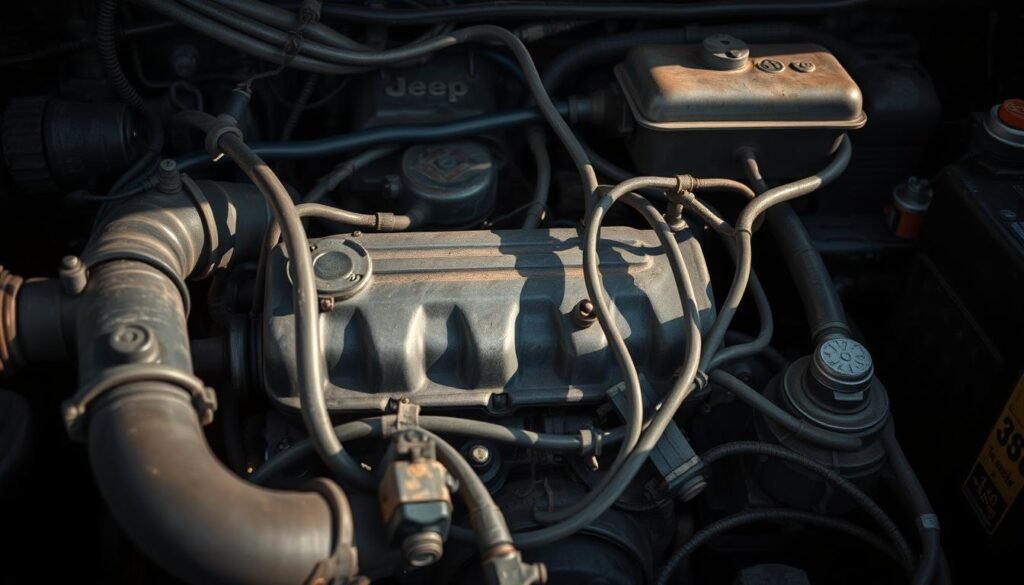
Other than fuel issues, corroded wires and connections can also stop your Jeep from starting. Bad electrical connections stop the electricity needed for starting.
It’s vital to check wires and connections regularly for corrosion. This keeps your Jeep running well and reliable.
Common Symptoms: Jeep Cranks But Won’t Start
If your Jeep cranks but won’t start, listen to the sounds it makes when you turn the key. These sounds can tell you a lot about what’s wrong.
They can help you figure out if the problem is with the battery, the starter, or something else.
Sounds When Turning The Key
When you try to start your Jeep, the sounds you hear are important. You may hear:
- Clicking Noise: This often means the battery is weak. It doesn’t have enough power for the starter.
- Grinding Sound: This noise suggests there might be a problem with the starter itself.
- No Sound: If there’s no sound, it could be the ignition system or other electrical parts.
Indicators of a Failing Starter
Noticing signs of a failing starter can save you both time and money. Look out for:
- Difficulty engaging: When the starter can’t turn the engine over smoothly.
- Unusual lag: If it takes longer than before to crank, take notice.
- Burning smell: Odd smells during cranking are a bad sign.
- Frequent attempts needed: Needing several tries to start could mean starter trouble.
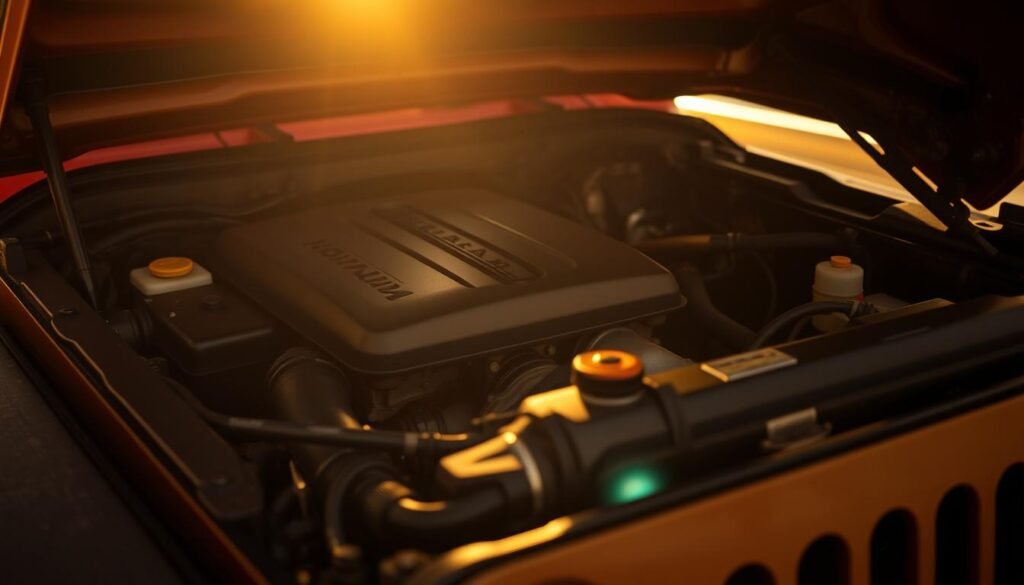
Jeep Not Turning Over: Understanding The Signs
When your Jeep won’t start, it’s often due to electrical system issues. These can be caused by several different things that might not be obvious at first. By carefully looking into the problem, you can identify and fix it.
Electrical System Failures
Electrical failures can make starting your Jeep impossible. A weak battery or old wiring can stop enough power from getting to the starter.
Check the battery connections. Corroded terminals or loose wires can block power. Regular checks keep your Jeep’s power flow smooth.
Power Supply to The Starter
Lack of power to the starter is a key issue if your Jeep won’t start. Check the battery’s voltage and the connection to the starter for problems.
If the battery seems fine but the Jeep won’t start, damaged wires to the starter might be the culprit.
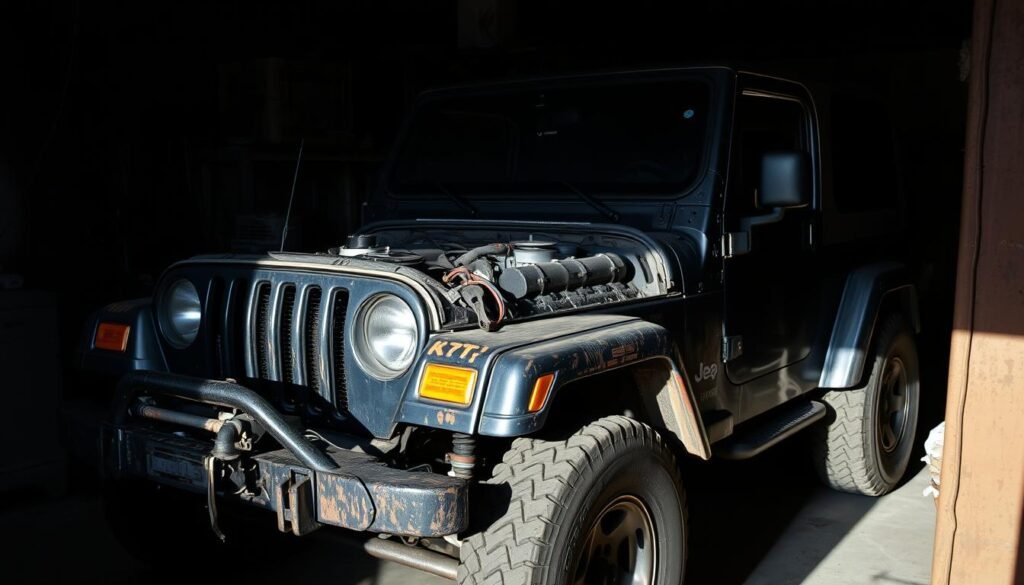
Possible Ignition Issues with Your Jeep
Having trouble starting your Jeep? It could be due to ignition problems. A bad ignition switch and a weak key fob battery are often to blame. These issues can mess with your Jeep’s starting system.
Faulty Ignition Switch
One big problem might be the ignition switch. If it’s broken, your Jeep’s electrical system won’t work right. You might have trouble turning the key, or the engine might not crank.
To figure this out, you can test the switch with a multimeter or get help from a pro.
Weak or Dead Key Fob Battery
A dying key fob battery could also be causing trouble. Modern Jeeps use the key fob to start the car.
If the battery is dead, the fob won’t talk to your Jeep, and it won’t start. Changing the key fob battery is an easy solution to try.
Investing in Advanced Diagnostics For Jeep Starting Problems
Figuring out why your Jeep won’t start can be tough. Using advanced diagnostics is key to finding and fixing these issues.
A top tool for this job is the OBD-II scanner. It gives important info needed to figure out what’s wrong.
Utilizing OBD-II Scanners
OBD-II scanners access your Jeep’s computer and give useful data. This data includes error codes and diagnostics that find the main cause of starting problems.
With an OBD-II scanner, you can:
- Retrieve diagnostic trouble codes (DTCs) that indicate specific malfunctions.
- Monitor real-time data from various sensors to assess performance.
- Identify whether issues are related to the electrical system, fuel delivery, or ignition components.
Having diagnostics like OBD-II scanners means you know more about your Jeep’s issues. This helps you make smart repair decisions.
Consulting Professional Mechanics
Sometimes, diagnostic tools can be hard to understand. When that happens, it’s smart to talk to professional mechanics. They know how to read complex data and fix your Jeep’s unique problems.
Getting expert help can:
- Save you significant time when diagnosing and fixing issues.
- Eliminate guesswork, minimizing the potential for costly repairs.
- Ensure a comprehensive assessment of your Jeep’s starting problems, leading to efficient solutions.
Working with skilled auto experts is essential for fixing starting issues smoothly.
Preventive Measures To Avoid Future Starting Issues
Keeping your Jeep running smoothly is key to avoiding starting problems. Taking steps ahead of time can make sure your car is always ready.
It’s important to get regular maintenance checks. These checks can find and fix small issues before they turn into bigger problems.
Regular Maintenance Checks
Make it a point to check on your Jeep regularly. Pay attention to these parts during inspections:
- Battery performance and cleanliness
- Starter integrity and function
- Ignition system efficiency
Looking at these areas can help stop starting problems from happening.
Upgrading Vulnerable Components
Think about upgrading parts of your Jeep that are weak. Things like old wires or electrical parts can affect how well your car starts.
Getting new parts can make your Jeep work better and last longer.
Remember to:
- Clean battery terminals regularly
- Inspect wiring for any signs of wear and tear
- Replace any faulty connectors that may hinder performance
Addressing Environmental Factors Affecting Start
Knowing about the environmental factors can make solving start problems in your Jeep easier.
Things like moisture and extreme heat or cold can really affect how it performs. It’s smart to keep these conditions in mind for your vehicle’s upkeep.
Impact of Moisture and Humidity
Moisture can cause big problems for your Jeep. It can make the electrical parts rust and lead to bad connections or electrical shorts.
To keep your vehicle working well, here are some steps you can take:
- Regularly inspect and clean electrical connections.
- Use moisture-repellent sprays on vulnerable components.
- Store your Jeep in a dry environment when possible.
Thermal Effects on Components
Cold and hot weather can mess with your Jeep’s ability to start. In the cold, your battery might not work as well, making it hard to start the engine.
And in the heat, parts can expand and break. Here’s how you can fight these temperature issues:
- Test your battery in different temperatures to ensure efficiency.
- Check fluid levels regularly, as they can evaporate quickly in heat.
- Shield vital components from excessive heat through regular maintenance and inspections.
Conclusion
Knowing why your Jeep won’t start is very important for owners. Common issues like battery problems and starter malfunctions can be fixed.
This knowledge lets you quickly deal with these issues, reducing your Jeep’s downtime.
We’ve covered various ways to troubleshoot, from simple ignition checks to considering the weather.
Using these tips can keep your Jeep reliable for your adventures. With this info, you’ll handle starting problems with ease.
Always remember, keeping up with maintenance stops issues before they start. If you stay ahead of problems, your Jeep will always be ready to go.
FAQs
Q: Why won’t my Jeep start?
A: Several reasons can make your Jeep not start. It might be the battery, the starter, ignition trouble, or engine problems. Look at the symptoms carefully to figure out the cause.
Q: What should I check if my Jeep cranks but won’t start?
A: First, see if the battery has enough power. Then, check fuel flow and ignition parts. Listen for odd sounds when you try to start it.
Q: How can I diagnose electrical issues preventing my Jeep from starting?
A: Look for corrosion on battery connections. Make sure the battery is full. Test the ignition switch and check if the wiring is okay.
Q: What does it mean if my Jeep’s Check Engine Light is on?
A: The Check Engine Light signals there might be a deeper problem. An OBD-II scanner can find out what’s wrong by giving you error codes.
Q: What types of sounds should I listen for when my Jeep won’t start?
A: Listen for clicking; it could mean a low battery. Grinding noises may show the starter is bad.
Q: How do I address fuel delivery issues in my Jeep?
A: Make sure the fuel pump works right and the filter isn’t blocked. Also, check for wiring problems that could stop fuel from getting through.
Q: What preventive maintenance can I perform to avoid starting issues?
A: Keep your battery, starter, and ignition in good shape with regular checks. Clean off any terminal corrosion, check for wear, and replace parts that often break.
Q: How does the weather affect my Jeep’s ability to start?
A: Weather can cause parts to corrode or make your battery work harder. Protect your Jeep by thinking about the weather in your area.
Q: When should I consider consulting a professional mechanic?
A: If you need complicated diagnostics or can’t figure out the problem alone, get help from a pro. It’ll save you time and make sure it’s fixed right.

